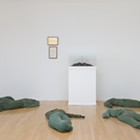John Kaplan thought documenting cancer was a cliché. That was, however, until cancer found Kaplan.
“I’d really never been sick, other than the common cold,” says Kaplan, a Pulitzer Prize-winning photographer who once worked for the Spokesman-Review.
“Everything was going along swimmingly. Just when you think you’ve got everything in place, you just get blindsided,” he says.
Kaplan has turned his experience into Not As I Pictured: A Pulitzer Prize-Winning Photographer’s Journey Through Lymphoma. It’s unique for photojournalists to turn the camera on themselves. But Not As I Pictured didn’t start as a project. Rather, Kaplan used his cameras as a coping mechanism.
“It actually was a diversion from the fear,” Kaplan says.
Kaplan’s Norman Rockwell postcard of a life began fraying when, in 2008, he noticed his belly button forming an odd shape. It turned out to be a herniated disc, but X-rays also revealed a kidney tumor. Doctors diagnosed it as non-Hodgkin lymphoma, a cancer of the blood.
Kaplan reacted by taking pictures. Of himself. His wife. His doctor. Those photos play like a slideshow through Not As I Pictured It. In style, the film shares elements of Kaplan’s photojournalism career, which has seen him create visual essays of crushing poverty in Russia, or, in the case of his 1992 Pulitzer Prize-winning piece, a cross-section of 21-year-olds from across the country. The hallmarks of his approach are snapshots of simmering emotion and close-ups that symbolize tragedy.
Kaplan, now 52, worked at the Spokesman Review in 1983 and 1984 as a general-assignment photojournalist. He went on to work at two different newspapers in Pittsburgh — he won the Pulitzer at the Pittsburgh Post-Gazette — before going on to freelancing and consulting. He’s now a professor of journalism, teaching photography, design and international journalism at the University of Florida.
In Not As I Pictured, there are photos in the doctor’s office as he takes on more bad news, a portrait of Kaplan’s hands full of hair as chemo began ravaging his body. Then, shortly after, scenes of Kaplan, surrounded by family, getting his head shaved.
Sometimes, it’s the film’s random moments of tragedy that are the most affirming, like when Kaplan worried his family wouldn’t recognize the formerly shaggy-haired photographer with his new shiny dome.
But his kids didn’t miss a beat, and didn’t think anything amiss of his head. Vignettes like these keep Not As I Pictured from rummaging in self-pity.
“It’s very upbeat, it’s very emotional, affirming, positive,” Kaplan says.
After all, who really wants to clock off work and watch a movie about someone’s true-life biological self-destruction? Kaplan realizes this, and while he “doesn’t sugar-coat the realities of cancer,” he aims for an uplifting message. He achieves this, of course, partly because he was lucky enough to survive.
Kaplan is spreading those vibes, gratis, to others stumbling through the grief and fear of a cancer diagnosis. That’s why 10,000 copies of Not As I Pictured are being given away for free. Kaplan says 6,000 copies have already gone out the door.
He hopes the film can be included in curriculum for second-year medical students as a tool for patient-centered care, which emphasizes empathy and communication over the jargon-prone sterility of the medical process. Instead of just giving clinical diagnoses, it’s a way for caregivers to relate with their patients.
“A patient is not just a chart or a case, but a real person with hopes and expectations,” Kaplan says.
The film is already being used in survivorship programs, which Kaplan says help cancer survivors with the psychological and logistical obstacles of moving back into life.
It’s another cliché Kaplan now inhabits: He’s one of 12 million cancer survivors in the U.S.
“I’m learning that you’ve got to find strength you never knew you had and somehow forge a positive attitude,” Kaplan says in the film. “Or your chances of surviving won’t be as good.”
Not As I Pictured It is his message of hope and grace. Says Kaplan: “Really, it’s part of my own healing.”
Not as I Pictured: A Pulitzer Prize-Winning Photographer’s Journey through Lymphoma • Thu, March 15 at 7 pm • Robinson Teaching Theatre, Weyerhaeuser Hall, Whitworth University • Free • (777-4739) • Free copies are available to caregivers and patients at notasipictured.org





















